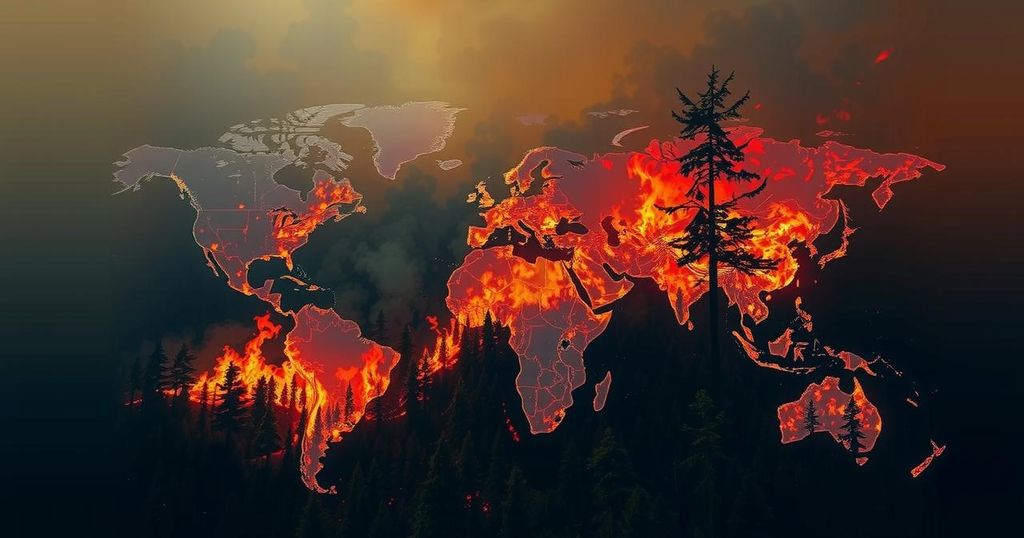Climate Change Fuels Global Wildfire Growth and Smoke-Related Deaths
Research published in “Nature Climate Change” indicates a direct link between climate change and the increase in wildfires globally, resulting in a sharp rise in smoke-related deaths from about 669 in the 1960s to over 12,500 in the 2010s. The studies highlight significant regional variations in wildfire trends, examination of climate’s influence on fire patterns, and the ongoing need for improved fire management and emission reductions to mitigate these risks.
Recent research has revealed a significant correlation between climate change and the increasing frequency and intensity of wildfires globally, exacerbating the public health crisis linked to wildfire smoke. Two studies conducted by researchers from Dalhousie University, Belgium, the United Kingdom, and Japan delivered alarming findings, showing a drastic increase in deaths attributable to wildfire smoke, from approximately 669 annually in the 1960s to over 12,500 in the 2010s. One pivotal study, published in “Nature Climate Change”, assessed wildfire models under varying conditions of climate influence, illustrating a distinct rise in the occurrence and strength of wildfires, particularly in sensitive ecosystems such as the African savannas, Australia, and Siberia. The research indicated, however, that while Africa has seen a reduction in wildfires—predominantly due to increased human activity and land fragmentation—regions like California and Siberia continue to experience escalating fire incidents, driven by heightened temperatures and prolonged drought conditions. Dr. Sian Kou-Giesbrecht from Dalhousie University stated, “The study is important because it shows and quantifies the influence of climate change on increasing wildfires worldwide, especially given the impacts of wildfire on society and its feedback to climate change.” The researchers utilized models incorporating various elements, from climate variables to population density, highlighting that human interventions can mitigate wildfire intensity but often fail to offset the dominating effects of climate change, particularly during years characterized by extreme weather. Seppe Lampe, a climate scientist at the Vrije Universiteit Brussel, observed, “What is striking is that in periods with low to moderate numbers of fires, direct human interventions have a large effect. However, in periods with many fires, the effect of climate change dominates, meaning that in these cases we lose control.” The analysis revealed that climate change has contributed to a nearly 16% increase in global burned areas from 2003 to 2019 and raised the likelihood of experiencing months with above-average burned areas by 22%. A complementary study published in the same journal assessed the impact of climate change on wildfire smoke-related mortality. Researchers from the National Institute for Environmental Studies in Japan found that the proportion of deaths linked to wildfire smoke has dramatically escalated over the past fifty years, rising from 1-3% in the 1960s to as high as 28% in the 2010s, particularly within regions such as South America, Australia, Europe, and the boreal forests of Asia. Dr. Kou-Giesbrecht emphasized the challenges of attributing wildfires to climate change, yet confidently remarked on the robustness of the research’s findings regarding this correlation. In light of these findings, the studies call for immediate and substantial reductions in greenhouse gas emissions, combined with strategic landscape and fire management approaches to mitigate the adverse effects of wildfires on human health and ecosystems.
The rise in wildfires globally is closely linked to climate change, an issue that has garnered increasing attention due to its adverse effects on both the environment and public health. The studies presented by researchers from various institutions explored how climate shifts are impacting wildfire incidence and intensity, as well as the consequent rise in deaths caused by smoke inhalation. The data reveals that, despite local variances, overall trends show a growth in fire activity correlated with climate fluctuations, emphasizing the need to address climate change proactively to safeguard human and ecological health.
In conclusion, the research demonstrates a troubling trend: climate change is driving an increase in wildfire frequency and intensity, leading to a substantial rise in mortality associated with wildfire smoke. This global health concern necessitates urgent action to reduce greenhouse gas emissions while enhancing fire management strategies. Without significant intervention, the future projections indicate a continuation of these detrimental trends, posing severe challenges for both public health and environmental stability.
Original Source: www.dal.ca




Post Comment